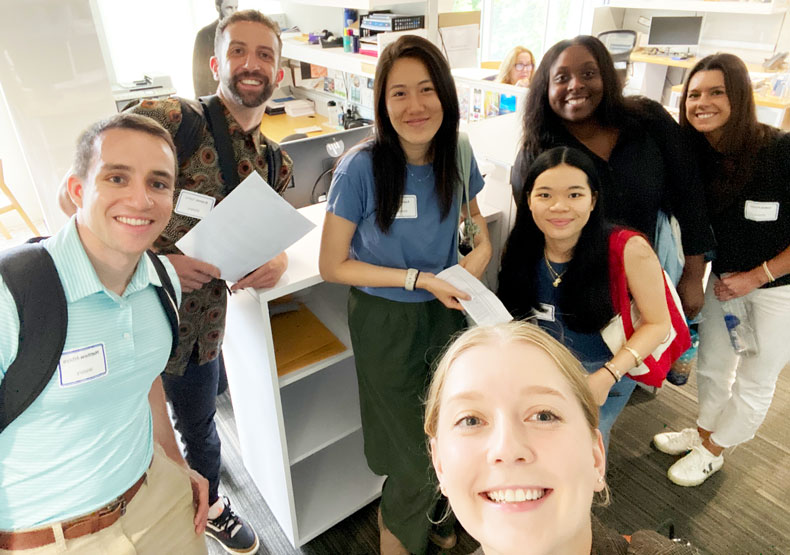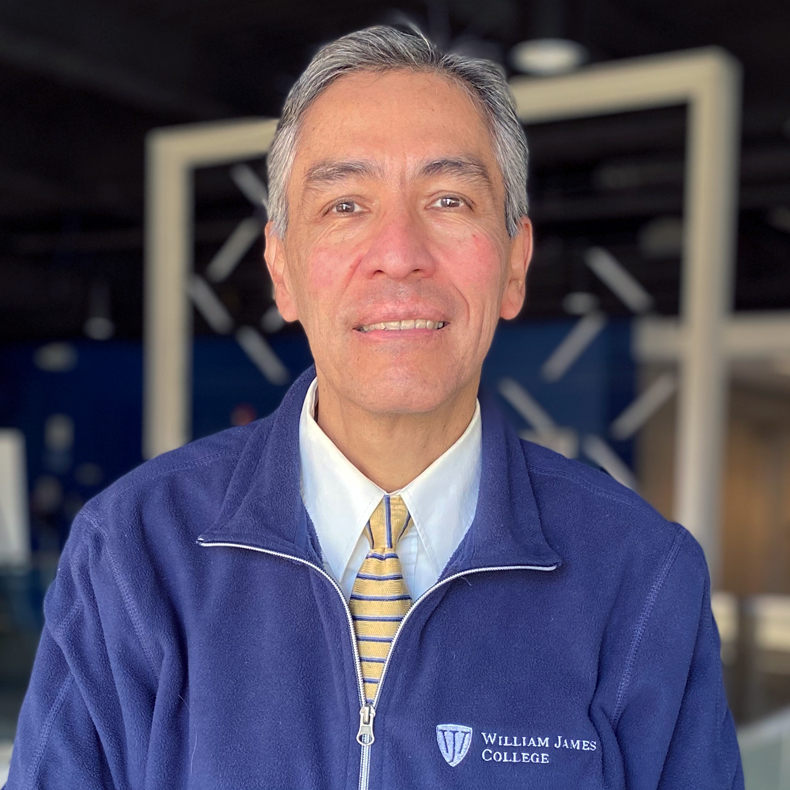50th Anniversary Entering Class Marks Largest in College's History

For five decades, the commencing of classes each fall has been a celebration of students choosing William James College and a career in psychology. In this 50th anniversary year, the College welcomed the largest and most diverse entering class in its history. By the numbers, this includes 330 new students—which represents a 15% increase over last year—one third of whom are first generation, 39% of whom identify as students of color.
“While these numbers reflect a trend of continued growth for the College, this is a greater jump than we had forecasted,” says Evan Grenier, Associate Vice President of Enrollment Management, who credits the leap to a trio of factors: The admissions and recruitment staff connecting with more prospective students; the marketing team casting a wider net to interact with the community at large; and faculty and staff making invaluable connections with potential students. As to the result of these collaborative efforts?
“A very diverse group [of students] which aligns with our mission,” says Mario Murga, Director of Admissions, in a nod to more numbers: 15% of incoming students identify as Hispanic; 10% of students identify as Black or African American; and 6% identify as Asian.
Since its founding, William James College has created programs to educate specialists of many disciplines to meet the evolving mental health needs of society. When Murga arrived on campus 24 years ago, there was but a single program: the PsyD in Clinical Psychology.
In the more than two decades since, the inaugural program of study at William James College has given way to upwards of thirteen, several with blended and fully online options, including bachelors, masters, doctoral degrees and certificates, to meet the needs of today’s busy professionals keen on advancing their careers in mental health, psychology, human services, and organizational leadership.
“We have broken ground in many arenas,” says Murga, who was provided an opportunity—but no roadmap—to build the admissions office and, by extension, diversify and grow the student body.
“We pride ourselves on being an institution with room for everyone to become the professional they strive to be,” says Murga who takes every opportunity given to celebrate the diversity on campus.

As to his favorite part of the admissions process?
“Being our authentic selves and welcoming others to do the same,” says Murga who underscores that remaining flexible and personalized in the College’s approach to meeting students’ needs throughout the admissions process is equally important.
“Mario’s institutional knowledge and leadership of our team make him a wonderful asset to William James College,” says Grenier who has been on campus for just over a year. Amidst a trend of declining undergraduate and graduate enrollment nationwide, William James College continues to occupy a niche.
“We are connecting with students around careers in mental health and leadership, and increasing name recognition as a result,” says Murga, in a nod to another arena in which William James College is excelling: Augmenting on-the-ground efforts to forge community partnerships and meet diverse audiences, that run the gamut from teachers and police officers to clinical psychologists and business leaders, where they are.
This fall, the Center for Behavioral Health, Equity, and Leadership in Schools (BHELS) is engaging K-12 educators from five districts in a strength-based approach aimed at creating supportive environments for their students; at the same time, law enforcement personnel and co-response clinicians from across the state, enrolled in the Graduate Certificate in Crisis Response and Behavioral Health, are receiving full scholarships through a grant from the Department of Mental Health.
While the College’s inaugural program remains its largest (with a total of 465 students in the Clinical Psychology PsyD program), the most significant increases in new enrollment this fall were found across the College's Master's programs, which included Clinical Mental Health Counseling, Organizational Psychology, School Psychology, Applied Behavior Analysis, and Psychology.
The continued growth of non-degree programs—among them the Behavioral Health Service Corps, Community Health Workers Training Program, and the Leadership in Community Behavioral Health—demonstrates the College's ongoing commitment to workforce development coupled with an increase in on-ramps for launching a career in psychology. These programs served a combined 116 participants in 2023-24 and are expected to serve 118 in the 2024-25 academic year; enrollment in the BHSC program alone jumped by 12 participants, from 48 last year to 60 this year—with 29 graduates going on to enroll in degree-granting programs at William James College.
From Murga’s perspective, the hard work required during the admissions and enrollment seasons pay off come June: “A huge source of satisfaction for our team comes when a student reaches graduation and says, This is the journey I needed to take, thank you for believing in me!”
Looking ahead to the next half century, while striving to be a preeminent school of psychology that integrates rigorous academic instruction with extensive field education and close attention to professional development, William James College has a solid foundation of excellence from which to grow and evolve.
“At a time when society is experiencing a significant rise in isolation, worry, loneliness, and substance use disorders—especially among our young people—the unique integration of rigorous academics, field education, and cultural diversity at William James College prepares clinicians to meet the behavioral health challenges of often marginalized populations and the leadership needs of organizations,” says President Nicholas A. Covino, PsyD.
“By equipping teachers, first responders, school administrators, and Veterans to create inclusive and supportive cultures, we are promoting well-being and preventing mental health challenges. As we welcome one of the largest and most diverse groups of students to our learning community, we are proud of their compassion and commitment to service.”
Topics/Tags
Follow William James College
Media Contact
- Katie O'Hare
- Senior Director of Marketing
- katie_ohare@williamjames.edu
- 617-564-9389
